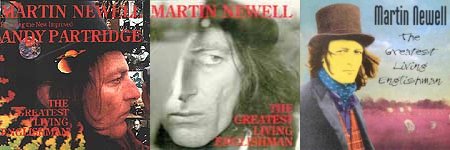
In 25 years of record buying, really only a handful of rock albums have
struck me as, you'll pardon the expression, complete artistic statements unto
themselves -- as original combinations of both lyric and melodic skills
informed with enough personality to reward repeat listens over the course of
more than, say, a year.
Beyond which, for such a record to really catch me on this level, it has to
work as a sort of a show -- as something with a beginning, a middle, and
-- you guessed it -- an end, and with some sort of coherent theme running
throughout.
Severe demands, I know. Rock record? Hell, most volumes of poetry
since the 50s (notable exception: Richard Hugo's The Lady in Kicking Horse
Reservoir) don't fill the bill. And as to the record albums that do, only
Sgt. Pepper's (the obvious choice) and, to greater or lesser extents,
the Move's Message from the Country, Bowie's Ziggy Stardust,
Dylan's John Wesley Harding, Big Star's Radio City, Procol
Harum's A Salty Dog, The Kinks Are the Village Green Preservation
Society (Perhaps their Arthur and Lola..., as well), The Band's The
Band, and maybe XTC's Skylarking (I can actually make a pretty good
case for that last one as pop-music companion-piece to Blake's Songs of
Innocence/Songs of Experience, especially if I've had a few) come to
mind.
You can, I feel confident in saying, add another one to that list. Martin
Newell's The Greatest Living Englishman -- you can almost tell from the
title, and certainly from the way the cover art mixes whimsy and menace so
effectively -- is such a record. It is charming, eccentric, harrowing,
engaging, depressing, and unabashedly entertaining all at once. It is also
informed with a sense of compassion seemingly rare amongst those who choose
studio pop as their medium of expression: like our favorite books and movies,
this is an album with heart.
But I did mention theme, and here the connecting idea has something
to do with falling from grace -- whether the aging town hipster mourning the
"dreaming fields" of his youth ("Goodbye Dreaming Fields"), the gardener
content to live on the edges of grey-flannel society ("Home Counties Boy"), the
boy and girl condemned to "cardboard city" by a society more interested in
preserving their own wealth ("The Jangling Man," "We'll Build a House"), or,
most effective and haunting of all, the pop star who's fallen from the public
eye to an early death ("The Green-Gold Girl of the Summer," and to an extent
the title track). The "concept," if you wish, is helped along by snippets of
sound and conversation credited to one Lol Elliott -- mostly men and women
clucking as only the English can cluck at this or that of our protagonists'
failures.
Musically The Greatest Living Englishman is an appealing melange of
chiming guitars, old-fashioned (i.e., decidedly 60s-ish) piano, organ, and
Mellotron sounds, great, galloping drums and bass, out-of-the-norm harmonies,
and the sorts of cleverly dramatic string arrangements that one heard before
strings became synonymous, in the minds of most pop-product producers and
engineers, with sweetening. It's Byrdsian jangle and eel pie combined
-- eccentric, as I said, and unabashedly English. Musical influences abound:
"A Street Called Prospect" recalls the Kinks at their music-hall best. The
title number borrows from producer Andy Partridge's own "Season Cycle." And is
it my imagination or does the coda to "The Green-Gold Girl" deliberately refer
to the end of Roxy Music's "In Every Dream Home, A Heartache"? No matter -- as
someone (Lester Bangs?) once said of Mott the Hoople, some artists can swallow
their influences whole and still come up sounding like no one but themselves.
So here's another one.
Newell's singing voice, like the themes and images he returns to throughout,
is itself critical to the record's mood -- of vulnerability and innocence,
tempered (corrupted?) by the knowledge that the world is after all not so kind
or forgiving or even pretty a place as it once seemed. Not a great singer in
the traditional sense (but then more accessible than today's standard-issue,
Richard Thompson-style "acquired taste" singers), Newell nonetheless carries it
off with great charm and character -- another voice, like that of Ray Davies or
Roy Wood, that you'll come to know and perhaps enjoy after just a few
spins.
And the songs, in case I need to say it plainly, are catchy as hell. I'm
amazed whenever I hear someone wring new, inventive melodies out of rocks's
stock-in-trade chord changes, and The Greatest Living Englishman is
cause for such amazement. But be forewarned: when you get one or another of
these songs caught in your memory and go back to hear it again, it is all but
impossible to resist playing the whole record through. And that, as I said, is
because this really is a show. You'll want to sit through the whole
thing -- not just a scene or two.
This is, in other words, a Great Album -- the kind that leaves you giddy
with discovery, not to mention thoroughly moved. And while few rock records
deserve such lavish praise, so does it seem a waste of time writing a single
word more when you should just be home listening to the thing. If you only
ever buy one record on my say-so, honestly -- make this the one.
-- Art Dudley


